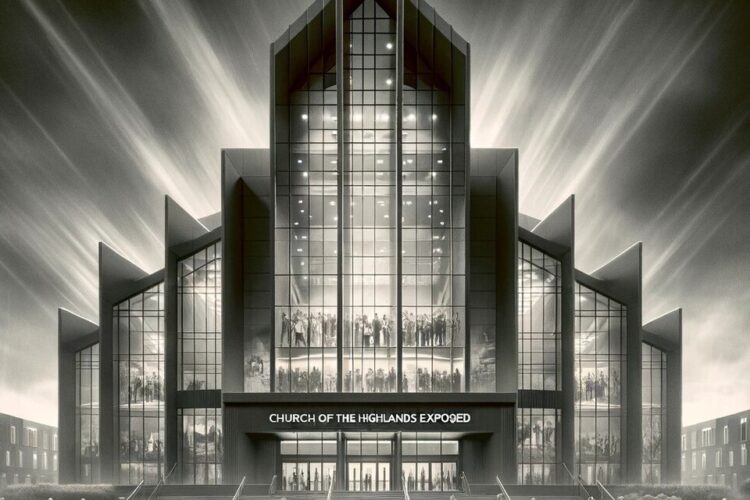The Church of the Highlands, one of the largest churches in the United States, has grown rapidly since its founding in 2001. With multiple campuses across Alabama and beyond, it has become a significant presence in the religious landscape. However, like many large organizations, it has not been without controversy. This blog aims to explore some of the issues and controversies that have surrounded the Church of the Highlands, providing an inside look into the church and its operations.
The Rise of the Church of the Highlands
Founded by Pastor Chris Hodges, the Church of the Highlands began with a mission to reach out to people and help them develop a relationship with Jesus Christ. From its humble beginnings in a high school auditorium, the church has grown exponentially, now boasting multiple campuses and an average weekly attendance of over 60,000 people.
The church’s success can be attributed to its contemporary worship style, practical teachings, and a strong emphasis on small groups and community service. It has been praised for its innovative approach to ministry and its ability to attract a diverse congregation.
The Controversies
Despite its success, the Church of the Highlands has faced several controversies. These issues have sparked debates and raised questions about the church’s practices and leadership.
-
Financial Transparency
One of the most significant controversies surrounding the Church of the Highlands is its financial transparency. Critics have questioned how the church manages its funds, particularly given its rapid growth and extensive operations. The church’s financial reports are not publicly available, leading to speculation and concern among some members and outside observers.
-
Political Involvement
Pastor Chris Hodges has been criticized for his perceived political affiliations. In 2020, he faced backlash for liking social media posts by Charlie Kirk, a conservative political commentator. Critics argued that Hodges’ actions were inappropriate for a religious leader and that they alienated members of the congregation who did not share his political views.
In response, Pastor Hodges apologized, stating that he did not intend to offend anyone and that his actions were misinterpreted. The church has since reiterated its commitment to being a place where people of all political backgrounds can come together in worship.
-
Racial Sensitivity
The Church of the Highlands has also been criticized for issues related to racial sensitivity. In addition to the controversy over Pastor Hodges’ social media activity, the church has faced scrutiny over its efforts to address racial diversity within its leadership and congregation.
The church has taken steps to address these concerns, including hosting discussions on race and implementing initiatives to promote diversity. However, some critics feel that these efforts have not gone far enough and that more substantial changes are needed.
-
Treatment of Staff and Volunteers
There have been allegations regarding the treatment of staff and volunteers at the Church of the Highlands. Some former staff members and volunteers have claimed that the church places excessive demands on them and that there is a lack of support for those struggling with burnout.
The church has acknowledged these concerns and has taken steps to address them. Initiatives to improve the work-life balance of staff and provide better support for volunteers have been implemented. However, these changes are still a work in progress, and some critics remain skeptical about their effectiveness.
The Church’s Response
The Church of the Highlands has not ignored these controversies. In many cases, it has taken steps to address the concerns raised by critics. Pastor Chris Hodges and other church leaders have publicly acknowledged the issues and have expressed a commitment to making improvements.
For example, the church has made efforts to increase transparency by providing more information about its operations and financial practices to its members. Additionally, it has hosted town hall meetings and forums to discuss issues of racial diversity and inclusion.
The church has also implemented policies to ensure that staff and volunteers are treated fairly and that their contributions are valued. These changes are part of a broader effort to create a more supportive and inclusive environment for everyone involved with the church.
The Positive Impact
Despite the controversies, it is important to recognize the positive impact that the Church of the Highlands has had on many people’s lives. The church’s commitment to community service and outreach has made a significant difference in the lives of countless individuals.
Programs such as the Dream Center, which provides resources and support to those in need, and the Highlands College, which offers training for future church leaders, are examples of how the church is working to make a positive impact on society.
Additionally, the church’s emphasis on small groups and personal connections has helped many people find a sense of community and support. For many members, the Church of the Highlands has been a source of spiritual growth and personal development.
Moving Forward
As the Church of the Highlands continues to grow and evolve, it will undoubtedly face new challenges and controversies. However, the church’s willingness to address these issues and make necessary changes is a positive sign.
Moving forward, it will be crucial for the church to maintain a focus on transparency, inclusivity, and support for its members. By doing so, the Church of the Highlands can continue to fulfill its mission and make a positive impact on the lives of its congregation and the broader community.
Conclusion
The Church of the Highlands has experienced remarkable growth and success since its founding, but it has also faced significant controversies. Issues related to financial transparency, political involvement, racial sensitivity, and the treatment of staff and volunteers have sparked debates and raised important questions.
However, the church’s response to these controversies and its commitment to making improvements are encouraging. By addressing these issues head-on and working to create a more inclusive and supportive environment, the Church of the Highlands can continue to be a positive force in the lives of its members and the community at large.
As with any large organization, there will always be challenges and criticisms. The key is how the church responds and adapts to these challenges. With continued effort and dedication to its core values, the Church of the Highlands can navigate these controversies and continue to thrive.




0 Comments